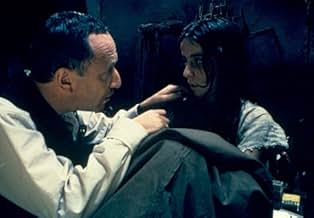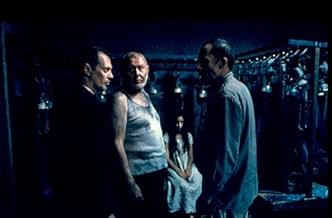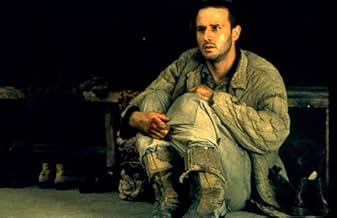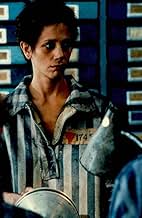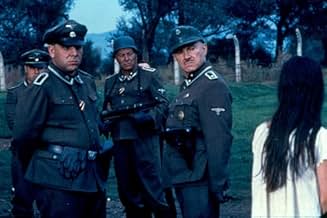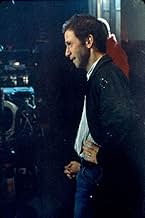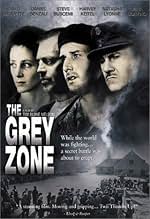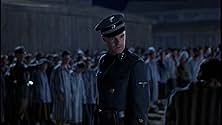A Nazi doctor, along with the Sonderkommando, Jews who are forced to work in the crematoria of Auschwitz against their fellow Jews, find themselves in a moral gray zone.A Nazi doctor, along with the Sonderkommando, Jews who are forced to work in the crematoria of Auschwitz against their fellow Jews, find themselves in a moral gray zone.A Nazi doctor, along with the Sonderkommando, Jews who are forced to work in the crematoria of Auschwitz against their fellow Jews, find themselves in a moral gray zone.
- Awards
- 1 win & 3 nominations total
- Lowy
- (as Georgy Zlatarev)
- Anja
- (as Lisa Benavides)
- Woman Inmate
- (as Dafina Katzarrska)
Featured reviews
There are several reasons you must see this film. First, it is based on the diary of Dr. Miklos Nyiszli, a Hungarian Jew chosen by Josef Mengele to be the head pathologist at Auschwitz. And it dramaticizes the true attempt by Sonderkommandos to destroy the Auschwitz gas chambers.
Second, it focuses on ethical dilemnas faced by Dr. Nyiszli and the various Sonderkommandos who are trying to save themselves, their families, or ... just someone ... anyone. To say that these men were "co-opted" by the Nazis is to ignore the horror of the coercion, debasement and dehumanization that the Nazis inflicted -- not only on their prisoners, but upon themselves. One can imagine that some Sonderkommandos were selfish -- just as some Kapos were cruel and some doctors who assisted the Nazis were accomplices. But the question remains -- what would you have done in the face of such coercion and duress?
Third, the film -- based on Tim Blake Nelson's play -- is not the typical Holocaust film. There is very little redeeming behavior. There is no uplifting ending. The grey zone of moral ambiguity is presented as a cold, unfeeling, horrifying place -- where you are damned if you do, and damned if you don't -- which means that they are all damned! For the first third of the film, the script is obtuse, confusing, and disconnecting -- as it should be, considering that we may as well be taking the point of view of someone who just arrived on a train and entered the gates of hell. How can any of this make sense? In the opening scene, the Doctor is asked to save the life of a Jew who attempted suicide. How absurd can that be -- to save the life of someone who will sooner rather than later be murdered by the Nazis anyway?!
In conclusion, the play/film contains dialogue and scenes that are memorable. This is one of my favorites. One Jewish leader is demanding that they destroy the gas chambers as soon as possible. But another Jewish leader is still planning on escape, arguing that he has every right to expect to live. The first leader replies, something to the effect that, after what he has seen and done, he does not want to live!
Today is Holocaust Memorial Day, April 18, 2004. Last night, after seeing a Holocaust documentary on Kurt Gerron ("Prisoner of Paradise") a friend of mine asked me what I would have done? I told her that it would depend on whom I was caring for -- my wife and my daughters -- my parents. It was then that I realized that I would have probably done everything that every Jew did during the Holocaust. I would have tried to save myself and my family. I would have abandoned others -- even betrayed others. I would have killed. I would have fought the Nazis. And I would have probably been killed for it. I would have despaired -- tried suicide -- become depressed, useless to everyone. I don't think I would have survived. I think the only question in that regard -- and it shows how irrelevant the question really is -- is "how soon would I have died." That is why I remember Holocaust Memorial Day -- so that I will never forget -- and I can help work towards a time when such a hell will not occur in Europe, in Africa, in the Middle East, in the US, ... anywhere.
An unthinkable,unconscionable deal has been worked out between a certain group of Nazi death camp inmates and their captors: in order to avoid the ovens(in all likelihood,only temporarily),these inmates would use their talents(among them,musical) to placate and ease along the funneling of other Jews and "undesirables" into the death chambers. A strong cast and an even stronger screenplay/script is augmented by very intelligent cinematography. Particularly good turns by David Arquette,Steve Buscemi,Daniel Benzali and Mira Sorvino as the inmates,all desperate,all convinced of what they have to do to survive and in Arquette's character's case,not even certain if it is even worth it.
It would be tempting to slam "Schindler's List" after seeing this,but I won't. SL is meant as an epic,a tribute,a story of the upside of surviving through the most dense of human tragedy,whereas GZ is a decidedly darker exploration of what happens to people in the same situation but are pushed into much less noble,much more selfish and desperate devices. Both are strong examples of the genre,but where GZ triumphs is that that it explores the most damning actions through the consciences of people faced with decisions that nobody should have to make. It is an unflinching portrait of a dark chapter in human history,rife with detail and completely lacking of lecturing. THis film is for anyone who wants to see an unvarnished and stark portrayal of the human condition brought to its lowest denominator. A must-see for college classrooms and Holocaust museums anywhere!
horrifying spectacle I vowed to never see it again. It is absolutely
among the most graphic, violent films ever made, save slasher/horror films. I saw it again to see what was buried
underneath the gore. It was surprising. As a historical document
alone The Grey Zone is unique and impressive. Countless small
details contribute to its originality: the blue-green color of the
Zyklon B crystals, the sprinklers constantly working the lawn
beside the crematoria, the clear, pretty daylight when the trains
arrive, the intimate building-to-building geography of Birkenau --
only the film Shoah manages to make these small historical
details count so much. What's left to be said about the Holocaust?
These things. Small things. Details. The grass, the sound ovens
make, sunlight hitting brick. Shoes. Luggage.
The Grey Zone is so unique that it has been misinterpreted. There
is virtually no music, nothing to tell you how to feel. It is exactly the
opposite of melodrama. The mundane repetition of the killings
actually numbs you after awhile, and this is intentional since this is
how the main characters are affected. There is no uplifting
message, and no cliched Zionist coda like Schindler's List
suggesting that all the suffering had a destination and a design.
There are some awkward elements in the film. But these are
minor next to the clarity of purpose and originality. The Grey Zone
should not become marginalized in the canon of Holocaust art
because it refuses to be sentimental. Hopefully it will be
referenced and reviewed for a long time.
Did you know
- TriviaWriter and Director Tim Blake Nelson made Dr. Miklos Nyiszli's memoirs "Auschwitz: A Doctor's Eyewitness Account" (1946) mandatory reading for the film's cast, along with Primo Levi's "The Drowned and the Saved" (1986) and Filip Müller's "Eyewitness Auschwitz" (1979).
- GoofsAfter the men set the crematoria 4 on fire they tore down the fences and fled into the woods. They barricaded themselves in a barn where SS caught them. They were burned alive inside the barn.
- Quotes
Hoffman: I used to think so much of myself... What I'd make of my life. We can't know what we're capable of, any of us. How can you know what you'd do to stay alive, until you're really asked? I know this now. For most of us, the answer... is anything. It's so easy to forget who we were before... who we'll never be again. There was this old man, he pushed the carts, and on our first day, when we had to burn our own convoy, his wife was brought up on the elevator. Then his daughter... and then both his grandchildren. I knew him. We were neighbors. And in 20 minutes, his whole family, and all its future, was gone from this earth. Two weeks later, he took pills and was revived. We smothered him with his own pillow, and now I know why. You can kill yourself. That's the only choice. I want them to save you. I want them to save you more than I want anything. I pray to God we save you.
- ConnectionsFeatured in WatchMojo: Top 10 Holocaust Films (2014)
- SoundtracksRoses from the South Op. 388
(1880)
Composed by Johann Strauss (as Johann Strauss)
Orchestrated and arranged by Jeff Danna and Andrew Lockington
Performed and conducted by members of the Bulgarian Symphony Orchestra
Details
- Release date
- Country of origin
- Official site
- Languages
- Also known as
- Gri Bölge
- Filming locations
- Production companies
- See more company credits at IMDbPro
Box office
- Budget
- $5,000,000 (estimated)
- Gross US & Canada
- $517,872
- Opening weekend US & Canada
- $24,526
- Oct 20, 2002
- Gross worldwide
- $621,592
- Runtime1 hour 48 minutes
- Color
- Sound mix
- Aspect ratio
- 1.85 : 1
Contribute to this page



